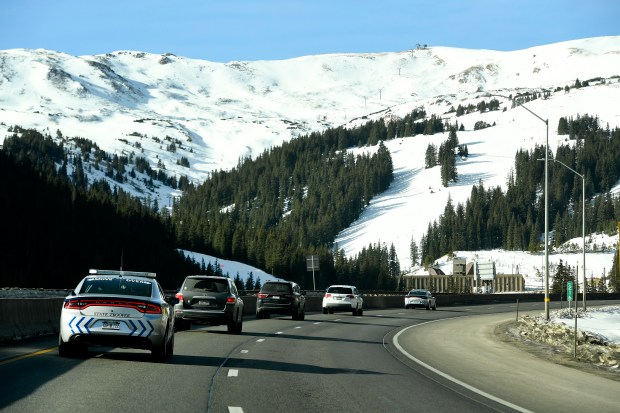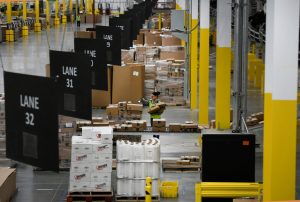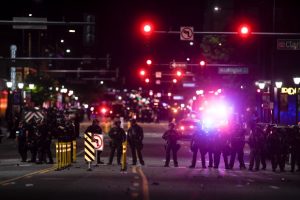Leo Gomez sat in bumper-to-bumper traffic just outside of Idaho Springs. The sky was clear and remnants of a previous day’s snow dusted the mountainside around him.
Little by little, his white SUV inched forward on Interstate 70 toward his destination: Vail.
There, staff at the local hospital awaited the arrival of the brown box sitting in the trunk of Gomez’s vehicle. In that box was another filled with dry ice to keep the precious vials it held cold.
A COVID-19 vaccine was on its way — or it would have been if the scene playing out Tuesday wasn’t part of an exercise conducted by the Unified Coordination Center, created by the Colorado Department of Public Health and Environment and the State Emergency Operations Center.
The simulated delivery from Denver International Airport was part of the state’s preparations for the first batch of Pfizer’s COVID-19 vaccine, which could land in Colorado as soon as this weekend if federal regulators issue an emergency authorization during a meeting Thursday.
Tuesday’s exercise was the first Colorado-led test of how prepared the state is to undertake what will soon be a mass vaccination campaign. The state participated in a simulation led by the federal government in late November. But in that exercise, a mock kit containing medical supplies ended up in Kentucky instead of Colorado.
The Department of Public Health and Environment ran similar exercises before the pandemic to prepare for such a major public health crisis. The simulations are important because they help state officials make sure their plans are effective and can reveal gaps that need to be addressed.
It was unclear what potential issues — if any — Tuesday’s simulation revealed about the state’s plans to distribute COVID-19 vaccines in Colorado. State officials also conducted a concurrent, virtual tabletop exercise on Tuesday.
Helen H. Richardson, The Denver Post
A convoy of vehicles including one transporting a facsimile of a COVID-19 vaccines, led by Colorado State Patrol officers, makes its way west on I-70 heading to Vail on Dec. 8, 2020 near Loveland Ski Area. With the state expecting its first shipment of a COVID-19 vaccine in a matter of days, the state health department ran an exercise to see how ready it is to take on such a mass vaccination campaign.
An ultra-cold challenge
What the Vail exercise did demonstrate is how Colorado is preparing to handle a vaccine that is particularly challenging to ship and store, especially to rural communities. Pfizer’s vaccine has to be stored at ultra-cold temperatures and will be delivered in thermal containers packed in dry ice. The number of doses in each order will range from 975 to 4,875. Pfizer’s vaccine requires people receive two shots, given 21 days apart.
Pfizer’s vaccine has to be stored at about -75 degrees Celsius, the equivalent of -103 degrees Fahrenheit. The dry ice in the boxes can be replenished, but the containers can only be opened twice a day. The vaccine can also be stored in a refrigerator at 2 to 8 degrees Celsius — or 35.6 to 46.4 degrees Fahrenheit — for five days, according to the state health department.
For smaller hospitals, the state is going to have to break down the doses into fewer quantities to distribute to local public health agencies and facilities to vaccinate health care workers, said Colorado National Guard Brig. Gen. Scott Sherman, who is leading the state’s vaccine distribution task force.

Helen H. Richardson, The Denver Post
Vail Health Hospital pharmacy technician Rob Brown holds the mock COVID-19 vaccine that had just arrived in a thermal shipping container in the pharmacy at the hospital in Vail on Dec. 8, 2020. Vail Health Hospital has the capacity to store up to 5,000 doses in its freezer.
“The biggest challenge for smaller hospitals — especially ones that don’t have ultra-cold freezers — is receiving it, putting it in their refrigerators because it can be stored in the refrigerators at 2 to 8 degrees Celsius,” he said. “But right when it gets in the refrigerators, they have five days to administer the vaccine.”
After he arrived at Vail Health, Gomez, the owner of Swift Courier Services Inc., loaded the box containing the mock COVID-19 vaccines onto a metal cart outside of the hospital. He was screened for the novel coronavirus, then escorted to the pharmacy, where he got the pharmacist’s signature before handing over vaccine.
Then, staff members who were dressed in full personal protective gear diluted the vaccine with saline. Once this process, which is called reconstitution, is completed, there will be five doses of the vaccine per vial.
“Then once you reconstitute, it’s good for six hours, and then you need to make sure that you administer the vaccines,” said Jessica Peterson, interim manager of inpatient pharmacy at the hospital.
Vail Health staff also practiced putting the box filled with the mock vaccine vials into the ultra-cold freezer that they will use when the real doses arrive. The hospital has a second freezer in its lab if more space is needed, said safety manager Kimberly Flynn.

Helen H. Richardson, The Denver Post
Vail Health Hospital pharmacist Jessica Peterson, left, places two boxes of mock COVID-19 vaccine into the hospital’s ultra-cold freezer on Dec. 8, 2020. The mock vaccines are packaged in the thermal shipping containers that uses dry ice to maintain a temperature of between -60 to -86 degrees celsius to keep the vaccines cold.
Approval expected soon
When Pfizer receives approval for its vaccine, the company will ship the vials directly to hospitals and any other providers. (For Tuesday’s exercise, the shipment was loaded into Gomez’s car at DIA and driven to Vail with a police escort and a small gaggle of state officials and journalists in tow).
The state Department of Public Health and Environment expects Pfizer can ship the first doses of the vaccine to states within 24 hours of the U.S. Food and Drug Administration granting it an emergency authorization use.
The FDA is slated to meet on Thursday to consider approving the vaccine. On Tuesday, it was announced that FDA scientists reanalyzed data from Pfizer’s still-unfinished study and found that so far, the vaccine appears safe and more than 90% effective across patients of different ages, races and underlying health conditions. The scientists specifically confirmed it works well in older people, who have experienced more severe symptoms from the novel coronavirus.
On Tuesday, as Colorado conducted its vaccine distribution simulation, Britain began vaccinations with Pfizer’s shots.
The progress toward a viable vaccine becoming ready to use comes as a third wave of new coronavirus hospitalizations has gripped Colorado, sending both hospitalizations and deaths soaring once again.
While the vaccine brings hope to what is predicted to be a dark pandemic winter, it likely will take months before Coloradans can throw away their masks and stop social-distancing. Public health officials expect there to be a very limited supply of any vaccine approved by federal regulators.
“While we’re all excited about the potential that the vaccine brings, we have to continue to remain vigilant,” said Will Cook, president and chief executive officer of Vail Health “This will help us in the long run. We still are in the middle of dealing with this pandemic.”

Helen H. Richardson, The Denver Post
Vail Health Hospital pharmacy technician Rob Brown practices measuring the exact dosage for a mock COVID-19 vaccine in the sterile compounding room in the hospital’s pharmacy in Vail on Dec. 8, 2020.
Spreading limited doses
When the state health department’s first vaccine order arrives, possibly this weekend, there will only be enough doses to give 46,800 people their first dose of Pfizer’s two-shot vaccine. That’s not enough to cover the 331,533 people — health care workers, first responders and residents of long-term care facilities — that are estimated to make up the first tier of Colorado’s vaccination plan.
The health department expects to receive vaccine doses in weekly batches, which the Centers for Disease Control and Prevention will allocate based on population. Colorado is expected to received 1.69% of available vaccine.
Vail Health is one of eight hubs in the state that has the ability to store and distribute the Pfizer vaccine. Every region in the state will have a vaccine distribution hub, which will help get the doses to rural and mountain communities. Officials have not identified the other seven hubs.
Part of the reason the state will break down the Pfizer boxes into smaller doses is to also help with distribution — which will be done across the state based on population — while supplies are limited, Sherman said.
“We don’t have that many doses to give to those smaller areas right now because our first distribution is only 46,800,” he said, adding, “It’s just making sure they get the quantities that we’re able to give them right now.”
Denver Post photographer Helen H. Richardson and The Associated Press contributed to this report.
Subscribe to bi-weekly newsletter to get health news sent straight to your inbox.



















